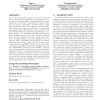Free Online Productivity Tools
i2Speak
i2Symbol
i2OCR
iTex2Img
iWeb2Print
iWeb2Shot
i2Type
iPdf2Split
iPdf2Merge
i2Bopomofo
i2Arabic
i2Style
i2Image
i2PDF
iLatex2Rtf
Sci2ools
118
click to vote
SIGECOM
2010
ACM
2010
ACM
The unavailable candidate model: a decision-theoretic view of social choice
One of the fundamental problems in the theory of social choice is aggregating the rankings of a set of agents (or voters) into a consensus ranking. Rank aggregation has found application in a variety of computational contexts. However, the goal of constructing a consensus ranking rather than, say, a single outcome (or winner) is often left unjustified, calling into question the suitability of classical rank aggregation methods. We introduce a novel model which offers a decision-theoretic motivation for constructing a consensus ranking. Our unavailable candidate model assumes that a consensus choice must be made, but that candidates may become unavailable after voters express their preferences. Roughly speaking, a consensus ranking serves as a compact, easily communicable representation of a decision policy that can be used to make choices in the face of uncertain candidate availability. We use this model to define a principled aggregation method that minimizes expected voter dissati...
| Added | 18 Jul 2010 |
| Updated | 18 Jul 2010 |
| Type | Conference |
| Year | 2010 |
| Where | SIGECOM |
| Authors | Tyler Lu, Craig Boutilier |
Comments (0)

